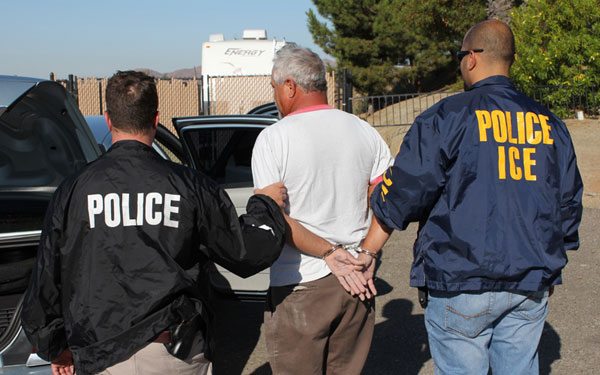
January 25, 2018; ColorLines and McClatchyDC
Last week, even after a number of courts have ruled against his efforts to impose federal enforcement procedures on local officials, Attorney General Jeff Sessions ratcheted up the pressure on cities and states that protect immigrants with undocumented status via sanctuary laws and policies.
In this latest throwdown, the attorney general threatened to issue subpoenas for documents that would show if the 23 cities named were abiding by federal immigration laws. If these cities—among them, Chicago, Los Angeles, West Palm Beach, Louisville, and New York City—and the entire states of California, Oregon, and Illinois are found to be out of compliance, they stand to lose federal grant money, some of it retroactively.
It is helpful to understand just what this letter from the Department of Justice is seeking from sanctuary jurisdictions. As Kate Irby from McClatchyDC explains:
The letter sent to the jurisdictions requests “all documents reflecting any orders, directives, instructions, or guidance to your law enforcement employees (including, but not limited to, police officers, correctional officers, and contract employees), whether formal or informal, that were distributed, produced, and/or in effect during the relevant timeframe, regarding whether and how these employees may, or may not, communicate with the Department of Justice, the Department of Homeland Security, and/or Immigration and Customs Enforcement, or their agents, whether directly or indirectly.”
“For example, if there’s a city council request to a police chief or sheriff to issue a directive to officers not to cooperate with ICE agents,” then that would fall under DOJ’s demands, the senior official said.
When asked how jurisdictions could provide documents that prove they are not doing something, the senior DOJ official said he understands it’s a “complex issue.”
Sign up for our free newsletters
Subscribe to NPQ's newsletters to have our top stories delivered directly to your inbox.
By signing up, you agree to our privacy policy and terms of use, and to receive messages from NPQ and our partners.
If a jurisdiction fails to respond or respond sufficiently in a “timely manner,” DOJ plans to issue subpoenas to obtain the information, the senior official said. If those documents fail to prove the jurisdictions are in compliance with Section 1373, DOJ may force the return of certain federal grants to those jurisdictions or withhold them in the future. DOJ specifically pointed to the Edward Byrne Memorial Justice Assistance Grant (JAG) program, the leading source of federal justice funding to state and local jurisdictions.
Attorney General Sessions couched these actions in issues of safety for citizens of this country, saying, “I continue to urge all jurisdictions under review to reconsider policies that place the safety of their communities and their residents at risk. Protecting criminal aliens from federal immigration authorities defies common sense and undermines the rule of law.”
His statement, and the threat of both subpoenas and loss of funding, were met with swift responses from mayors from many of the 23 cities on this list (and others who made earlier lists) who were meeting in Washington for the US Conference of Mayors. New Orleans’s Mayor Mitch Landrieu, chair of the conference, canceled a meeting at the White House and issued this statement: “Unfortunately, the Trump administration’s decision to threaten mayors and demonize immigrants yet again—and use cities as political props in the process—has made this meeting untenable.”
If precedent holds, the likelihood of such tactics resulting in success for the DOJ is not good. Previous threats and attempts at withholding funding from sanctuary cities has resulted in court decisions that favored the cities, not the Department of Justice. According to the Washington Post, Sessions threatened to pull $39 million in grants to sanctuary cities in fiscal year 2016, but this was blocked by two federal judges. Another federal judge found that Sessions’ had overreached when he was sued by Chicago in a suit that contended his federal policy was unconstitutional. A permanent injunction was issued in November 2017 to block Trump’s executive order denying federal funding to sanctuary cities after San Francisco and Santa Clara County filed lawsuits.
Chicago’s Mayor Rahm Emanuel referenced this judicial precedent in response to Attorney General Sessions’ current threats, saying, “The idea that you are also going to take leaders, mayors, and put them in legal and criminal jeopardy because there’s a disagreement—where in fact the courts already ruled both in our case and I think also the California case in San Francisco contrary to the Justice Department—it is really an amazing take for the attorney general to disregard what the court system has already said uniformly from coast to coast.”
The issues and threats here play out at many levels. If cities, counties, and states put in place their own statutes of how and when they will and will not cooperate with federal law enforcement agencies, issues of jurisdiction become paramount. Both local and federal agencies believe they are upholding laws and protecting citizens. At the local level, the trust and cooperation of all residents, whether documented or not, in local law enforcement is seen as helpful in keeping the peace and enforcing the law. At the federal level, being able to count on local law enforcement to turn over all undocumented immigrants is deemed essential.
As those who live and work in sanctuary cities look at how their communities deal with this next onslaught of legal and punitive efforts at mandating compliance with efforts to deport undocumented immigrants, the question for nonprofits and all who will be touched by these issues will be: Will you stand by and allow this to happen in your city or town?—Carole Levine













